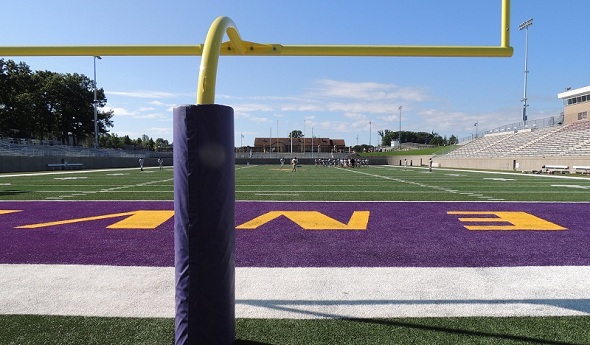
A Legacy Begins in Greenville
August 24, 2012
By Geoff Kimmerly
Second Half editor
GREENVILLE – Curtis Heppe has no idea what to expect, but a few guesses and a dream or two of how it will feel tonight to lead his teammates into Greenville's Legacy Field for the first time.
“It’s going to be electric, for sure. It’s a new vibe. It’s high-tech there,” the Yellow Jackets quarterback said Thursday after his team’s final preseason practice.
Those expectations are shared by a community that will be cheering on the local team in a new home after nearly a century at the legendary Black Field.
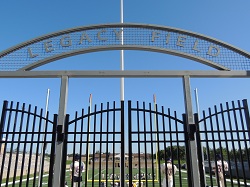 Workers put the finishing touches on the near-$7 million facility this week in advance of the season's first varsity game, tonight against rival Belding. Legacy Field officially opened for Wednesday’s freshman game, and Heppe said that even for that lower-level appetizer, the stadium began to come alive.
Workers put the finishing touches on the near-$7 million facility this week in advance of the season's first varsity game, tonight against rival Belding. Legacy Field officially opened for Wednesday’s freshman game, and Heppe said that even for that lower-level appetizer, the stadium began to come alive.
“We’ve just wanted Friday night to come. To get in and see how intense, how nice this place is,” he said. “Coming out of that tunnel, seeing our fans, it’s going to be the best feeling.”
Tonight’s grand opening will be the culmination of efforts from not just administrators, but students and community members as well – down to the name of the stadium itself.
“Legacy Field” was selected by Greenville’s school board. But it came as a suggestion from the school’s student council, which took submissions from classmates and then with faculty and administrators whittled the list to three favorites – Stinger Stadium and Community Field were next on their list.
But that’s just one way Legacy Field is a blend of old and new and ideas from all over town.
“In development, (it’s been) probably 10 years. We’ve been talking about it ever since I’ve been here, that one day we’d be able to do this,” said Greenville athletic director Brian Zdanowski, who is entering his 15th school year at that post. “It came through strategic planning. It came through community input. And then ultimately, our board bought in that there was enough interest in the community.”
Deeply rooted
A walk through Legacy Field is a history lesson. But first, an explanation of the Yellow Jackets’ past.
Black Field had served as the team’s home since 1916. It is nestled downtown next to Greenville’s former high school, which is now a library.
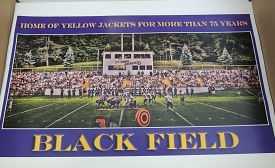 The current high school, about 1.5 miles northwest, was built in 1963. Football teams continued to make the short trip for home games.
The current high school, about 1.5 miles northwest, was built in 1963. Football teams continued to make the short trip for home games.
Black Field has its charms. With no track surrounding the field like at many multi-purpose stadiums, fans are only a few yards from the sideline. And all of that history added to the mystique for the latest players to wear the uniform.
The field also has had peculiarities. Zdanowski said at one point, the end zones were elevated in the corners. And the field wasn’t always square – a 10-yard penalty might measure 11 on one side of the field but only nine yards on the other.
But after just about every home game, students met for a bonfire on the grounds, an extension of the celebration by neighborhoods that surround Black Field and embraced the team for decades.
“It was the typical focal point of the community,” Zdanowski said.
Some things old, many new
Playing on Black Field was special, Heppe added. But he's equally if not more excited to be part of this new legacy. And architects made sure to bring that community feel to the new home this fall.
Destruction and construction began May 2, the day after last season’s final girls tennis match. The courts formerly sat in what is near the south end zone, and were moved closer to the track and soccer facility.
Amenities at the Yellow Jackets’ new football home are comparable to a college stadium’s, starting at the north side of the field.
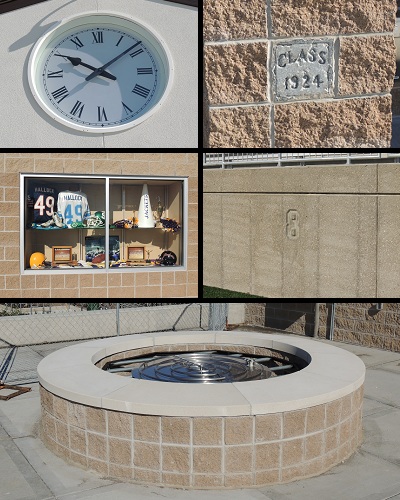 Players will enterthrough a tunnel that pours into the field like that of a miniature Spartan Stadium. Surrounding the tunnel are expansive locker rooms both for the home team and visitors, a similarly expansive training room and officials area and plenty of storage that will allow Greenville’s entire football program to be housed under that one roof. Unlike Black Field, tucked neatly among its neighbors, Legacy Field has plenty of parking and lighting, and builders were able to make that possible while also keeping intact a group of large oak trees near the south gate.
Players will enterthrough a tunnel that pours into the field like that of a miniature Spartan Stadium. Surrounding the tunnel are expansive locker rooms both for the home team and visitors, a similarly expansive training room and officials area and plenty of storage that will allow Greenville’s entire football program to be housed under that one roof. Unlike Black Field, tucked neatly among its neighbors, Legacy Field has plenty of parking and lighting, and builders were able to make that possible while also keeping intact a group of large oak trees near the south gate.
The turf is synthetic, like that played on by all but one member of the Yellow Jacket’s O-K Bronze conference. The difference from many is that the field has been dug out from the surrounding property, making it even more a focal point for those who will occupy the roughly 4,000 seats in the surrounding cement bowl. (The removed dirt was used to build two Little League fields on another part of the property.)
The sound system is of course state-of-the-art, and the press box, concessions area and restrooms also are equally expansive. But what locals should notice most are the throwbacks to the past that dot every corner of their new home.
Cut into the brick work near the concession counter is a block from Black Field that had been dedicated by the school’s class of 1924. Atop the building is the Centennial Clock, 100 years old this year, which formerly hung at the entrance the old school and was donated by the class of 1912. It has been housed by Greenville’s museum until being re-donated to the school district to become part of the stadium.
Molded into the cement walls on the west and south sides of the field are the numbers formerly worn by players Henry Loding and Greg Blumberg. Both died from football-related injuries; Loding in 1906 and Blumberg in 1977. Two trophy cases are cut into the stone on the facing of the press box, including one featuring mementos celebrating alum and former Detroit Lions tight end Ty Hallock.
Another addition of historical significance will come later. The school’s first Hall of Fame class will be inducted before the Sept. 7 game, and that display will be housed near the south ticket area so residents and fans can check it out without having the enter the stadium itself.
And one last thing was added to keep with tradition. To the west of the concession area, but within the stadium fence, sits a large gas fire pit for those postgame gatherings – plus a sound system where students can plug in their mp3 players.
“We said we’re not forgetting our past, but we’re embracing our future,” Zdanowski said. “I’m sure a lot of people have said that before. So we really wanted to make sure we got community input on it and do as much as we could to replicate Black Field. … And I think we won some people over. We really wanted to do what we said (we’d do).”
PHOTOS: (Top) Greenville's junior varsity ran through drills during a morning session at Legacy Stadium, which opened this week. (Top middle) The ticket area and gate for fans sit on the south side of the field. (Middle) A poster given out last season celebrated the final to be played at Black Field. (Bottom middle) A number of pieces of Black Field's past and Greenville tradition were brought over to or included in Legacy Field, including Centennial Clock, which formerly was part of the old school.
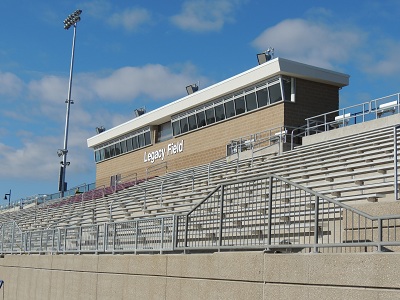
Legacy Field's press box is split into areas for game workers, coaches and media with a roll-up door for film crews.
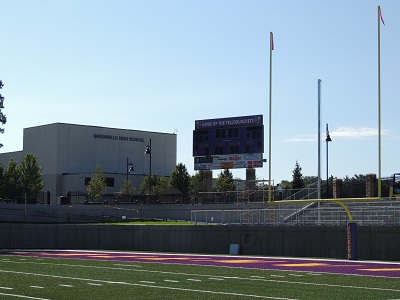
Legacy Field sits between Greenville's high school and middle school and adjacent to its soccer and track facilities.
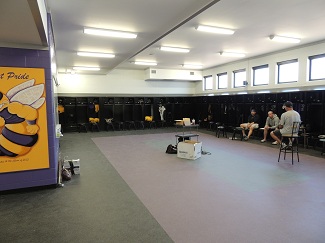
Coaches met in the spacious varsity locker room Monday morning. Junior varsity and freshman locker rooms are connected by a hallway with access to storage areas and the coaches' office.
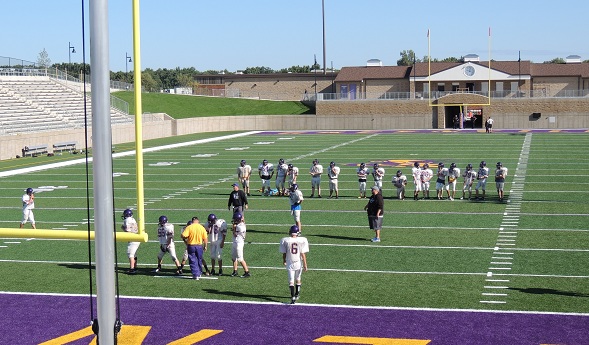 Players will enter Legacy Field through a tunnel at its north end. Above sits the concession area and restrooms, and the Centennial Clock that once ticked in the old Greenville school.
Players will enter Legacy Field through a tunnel at its north end. Above sits the concession area and restrooms, and the Centennial Clock that once ticked in the old Greenville school.
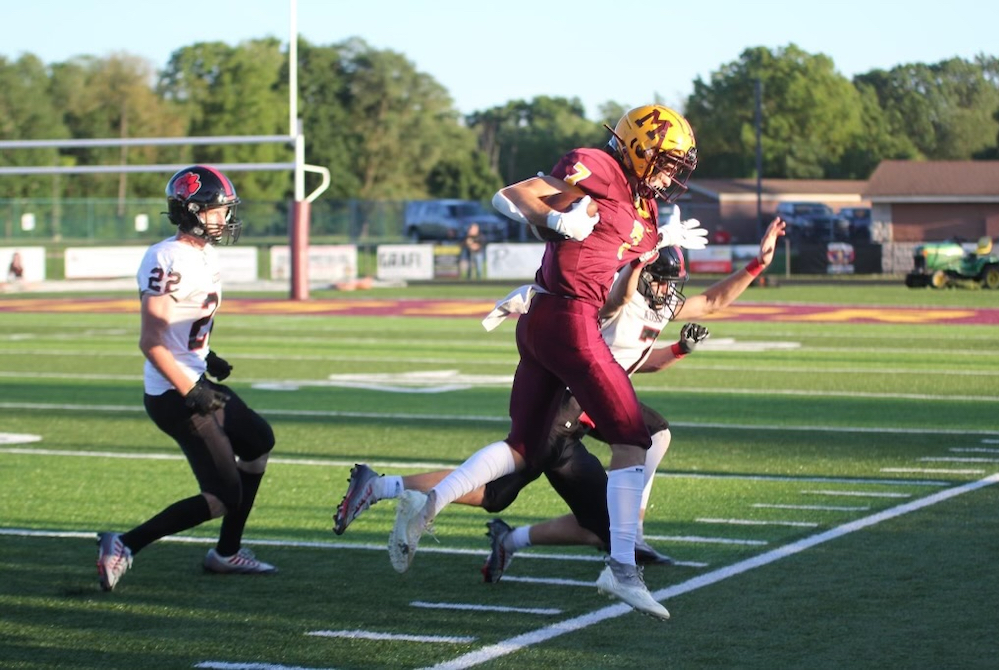
Culture Change Creates More Organized, Motivated & Successful Manchester
By
Doug Donnelly
Special for MHSAA.com
September 27, 2022
Manchester’s football team is going through a re-birth.
 One of the team’s top players – senior Jaxon McGuigan – calls it a change in culture.
One of the team’s top players – senior Jaxon McGuigan – calls it a change in culture.
“This summer, when we were having workouts or lifting, we had 30 guys show up every time,” said McGuigan, the team’s leading receiver. “When I was younger, there were times we would have only 10 guys. If we had 10 guys there now, we knew something would be wrong.”
Manchester is one of the oldest prep football programs in the state. It also has been one of the most successful. From 2003-16, the Flying Dutchmen made the playoffs 13 of 14 seasons, including a streak of nine straight. Then, for a variety of reasons, the bottom fell out.
Manchester went from 9-2 and a Cascades Conference championship in 2015 to back-to-back 4-5 seasons in 2017 and 2018, a 2-5 record in 2020 and 3-6 last season.
Head coach Ben Pack was brought in to make changes to the program. He’s delivered. Now in his third season, the Dutchmen have a signature win over three-time reigning league champion Addison and stand 4-1 midway through the season. They are firmly in the playoff hunt and are just a game behind league leader Napoleon, the only team to beat them this season. Even that was a close game until the end.
“Our numbers were so low when I got here,” Pack said. “We struggled. That first year, the COVID year, we could barely put together a scout team.
“When I got here, we had four guys returning from the previous year and six juniors who were on JV as sophomores,” Pack said. “Ten guys in the program. I had to do a lot of recruiting in the hallways. We had to get kids out for football.”
Pack is a veteran coach. He is a Jackson native who started his coaching career at Jackson High School while in college. He became the head coach at Parma Western in 1983 and headed home to Jackson after that. The Vikings put together a string of good teams, including the 1999 group that was Jackson’s first playoff qualifier.
Pack left Jackson in 2002 to become an administrator, but remained in football when he joined the Albion College staff. He returned to the high school ranks a couple of seasons ago at Parma Western as a volunteer assistant. Two seasons later he was named head coach at Manchester.
Pack has not only been recruiting in the Manchester hallways, but he’s also been busy implementing a strength program.
“We had no organized lifting program,” he said. “We had guys who would come in to lift, but nothing organized. Now the kids come in and they are working, they are getting stronger and more mature. Those kids who were freshmen and sophomores when I got here are stronger and more mature. With strength and maturity comes confidence.”
One of his players that first year was a freshman quarterback, Kannon Duffing, who made one start.
“He competed,” Pack said. “He was definitely a half-pint, but he played, and he did a nice job. He completed passes. He wasn’t ready to win, yet, but he grew from it and learned from the experience.”
Duffing completed 60 percent of his passes last year for 1,273 yards and nine touchdowns. This season, he’s been even better. Through five games, Duffing has completed 57 of 82 passes, a healthy 69.5 percent, for 821 yards and nine touchdowns. His interceptions have dropped from eight last year to just two this fall.
“We don’t throw deep a lot,” Pack said. “But what we do throw, he’s very accurate. He gets the job done. He’s the unsung hero for us. He’s the catalyst. He is the key to the whole thing.”
Wide receiver Andrew Campbell, running back Wyatt Carson and McGuigan are benefactors of Duffing’s accuracy.
“He is so good,” McGuigan said. “I know he’s going to put the ball right there. We have other good receivers, too, and he does a great job at getting us the ball. Our game plan is not to just get the ball to me.”
McGuigan is a former quarterback himself. He shifted to receiver early on in his career at Manchester and likes the move. He’s now a 6-foot-2, 170-pound college prospect. He’s a three-sport athlete with a 4.0 GPA.
Pack said McGuigan has great technique in the way he runs routes.
“Every successful team has a player or two that the other kids count on,” Pack said. “Jaxon has accepted that responsibility and is a role model for handling the pressure.”
Through five games, McGuigan has caught 37 passes for 554 yards and seven touchdowns. The biggest came with time running out against Addison and helped the Flying Dutchmen overcome a two-score deficit to defeat the Panthers. The Flying Dutchmen defense came up big in that game, too, when they put together a goal-line stand during the final moments to keep Addison out of the end zone.
“To be honest, that’s the type of game the last couple of years that we wouldn’t win,” McGuigan said. “To beat them just shows that everyone has buy-in now. It just shows how we’ve changed the culture here.”
Two weeks ago, Manchester bounced back from the Napoleon loss to win against East Jackson. McGuigan had one of his biggest games with eight catches for 106 yards and two touchdowns.
East Jackson coach Joe Niehaus said McGuigan is one of the most complete receivers he’s coached against.
“He runs great routes and catches virtually everything thrown to him,” Niehaus said. “On top of that, he is a threat to go the distance after the catch every single time.”
Manchester has conference games remaining against Michigan Center, Hanover-Horton, and Grass Lake. The Dutchmen are a top-10 team in Division 7 playoff points and are sitting nicely as they attempt to get back into the postseason.
“Ever since Coach Pack came here, it’s been drilled into us to trust the process,” McGuigan said. “We’re still far from where we could be as a team.”
 Doug Donnelly has served as a sports and news reporter and city editor over 25 years, writing for the Daily Chief-Union in Upper Sandusky, Ohio from 1992-1995, the Monroe Evening News from 1995-2012 and the Adrian Daily Telegram since 2013. He's also written a book on high school basketball in Monroe County and compiles record books for various schools in southeast Michigan. E-mail him at [email protected] with story ideas for Jackson, Washtenaw, Hillsdale, Lenawee and Monroe counties.
Doug Donnelly has served as a sports and news reporter and city editor over 25 years, writing for the Daily Chief-Union in Upper Sandusky, Ohio from 1992-1995, the Monroe Evening News from 1995-2012 and the Adrian Daily Telegram since 2013. He's also written a book on high school basketball in Monroe County and compiles record books for various schools in southeast Michigan. E-mail him at [email protected] with story ideas for Jackson, Washtenaw, Hillsdale, Lenawee and Monroe counties.
PHOTO Manchester receiver Jaxon McGuigan holds on to the ball while Addison defenders take him out of bounds. (Photo by Mark Ball, courtesy of the Manchester football program.)

